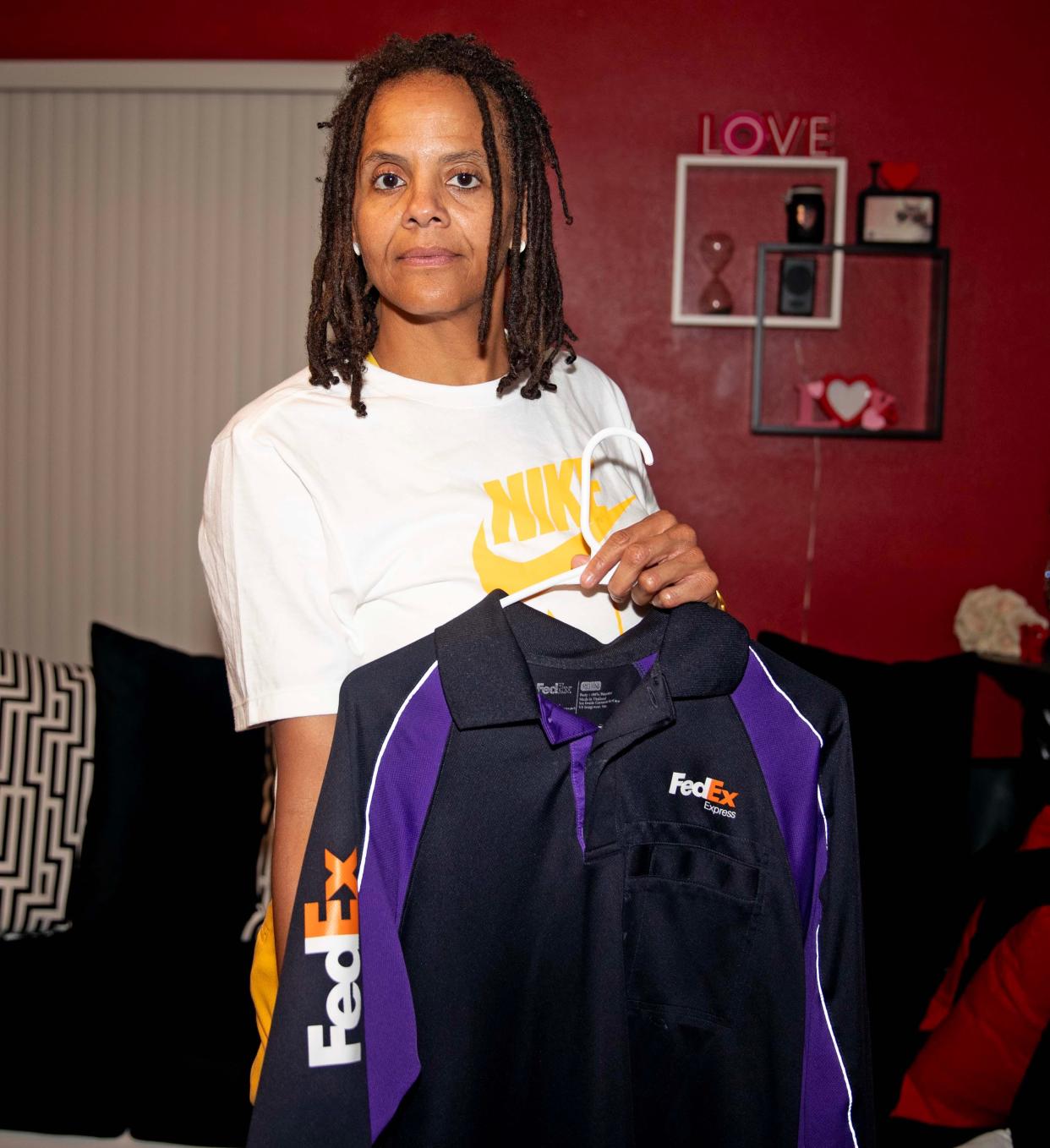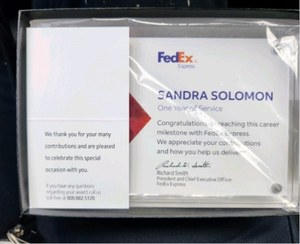A Waukesha FedEx driver tried to report sexual harassment at her job. She got nowhere.

Editor's note, Dec. 7, 2023: This story has been updated to clarify the state appeals court's reasoning for reversing Waukesha County Circuit Judge Michael Aprahamian's decision in a child custody case.
When Sandy Solomon was hired as a delivery driver for FedEx Express in Waukesha last spring, she thought she'd found a long-term job.
As a locally-known LGBTQ+ activist and Milwaukee Bucks superfan, she's used to hearing "Hey, Sandy!" wherever she goes, from running errands to cheering at a game.
But Solomon, 52, also values keeping her personal life private, especially at work.
At first, Solomon was able to maintain this balance. But starting in December, a coworker began crossing her boundaries by repeatedly asking about her sexual orientation, she said.
Solomon said his questions were soon accompanied by sexual comments. She started to fear for her safety.
"I already got a man at work continuously asking me if I like men or women," Solomon texted a friend in March, shortly before she decided to report him.
But when Solomon reported the behavior to FedEx, she said the company failed to take her seriously and was not transparent about its investigation. When she took the case to the courts, a judge called her "hypersensitive” and questioned why she didn’t simply tell her coworker to “pound sand.”
It wasn't until months after the ordeal that Solomon found out another employee had similar experiences with the same coworker.
By then, Solomon had quit.
Her experience illustrates the long and disappointing road that many LGBTQ+ people and people of color face when reporting harassment in the workplace, advocates said.
According to a 2020 study by the Gallup Center on Black Voices, one in four Black workers face discrimination. Half of the LGBTQ+ adults surveyed by the Center for American Progress last year said they have experienced discrimination in the workplace.
"Sandy is not the only instance or the only case of workplace harassment that I've come across in this work at all — actually, very far from it," said Andrew McKee, an anti-violence program advocate for the Milwaukee-based nonprofit Diverse and Resilient.

FedEx conducted an internal investigation into the coworker that found no wrongdoing. The company said it cannot disclose any details about the investigation for privacy reasons.
"At FedEx, we take the safety and security of our team members very seriously, and we thoroughly investigate any reported allegations of misconduct," said FedEx spokesperson David Westrick. "To protect the privacy of our employees, we cannot share any information on internal investigations."
Solomon's coworker denied making unwanted sexual advances toward anyone. He also denied that he repeatedly asked Solomon about her sexual orientation. The Milwaukee Journal Sentinel is not naming him because he has not been charged with any crime in this case.
FedEx investigation leads to disappointing conclusion for Solomon
Solomon said the interactions with her coworker, a mechanic, started out normally, usually chatting about her red Mercedes because of their shared interest in cars.
Then, Solomon said he started to repeatedly ask what her sexual orientation was, despite her ignoring the question every time.
As an LGBTQ+ advocate, Solomon said it's not difficult for someone to find out that she is a lesbian with a simple Google search. Still, she didn't want to disclose her sexuality at work, she said, and was afraid of what his reaction would be if she answered.
Another time, she said the coworker asked if she was going to "shake her ass" at the Bucks game.
In another incident, Solomon said she asked him to look at a warning light on her truck's dashboard, describing it as "something long with a drip mark." According to Solomon, he gestured to his penis and said he thought she was referring to it.
Solomon reported him to managers in early March. As she waited for a response, his behavior worsened, Solomon said. She suspected he knew.
She texted a friend later that week: “He’s amping it up,” she wrote.

FedEx suspended him with pay for six weeks while the company conducted an investigation into Solomon's claims. The company's code of conduct prohibits discrimination or harassment, specifically mentioning unwelcome sexual advances.
According to the Wisconsin Department of Workforce Development, unwelcome sexual advances that create an intimidating, hostile or offensive work environment fall within the legal definition of harassment.
Once an employer is notified of harassment, it has a responsibility to correct the situation and protect the employee from further harassment, according to the Equal Employment Opportunity Commission. This starts with a prompt and thorough investigation into the employee's claim.
Ultimately, FedEx did not find any wrongdoing and said he could come back to work, both Solomon and the coworker in question told the Journal Sentinel.
Solomon said FedEx declined to give her any details about the investigation or show her any of the evidence it allegedly reviewed. Her coworker told the Journal Sentinel the company reviewed surveillance footage from the FedEx warehouse.
He denied all of Solomon's claims and said the one time he remembers interacting with her is when he tried to help her request time off of work.
"All that wasted time to investigate it, and there was nothing," he said.
He added that he recently "retired" from the job. FedEx declined to confirm this for "employee privacy reasons," a spokesperson said.
Waukesha judge reverses Solomon's restraining order against her coworker
Solomon wanted to keep working at FedEx Express. She had just received an award for completing her first year of safe driving for the company, she said.
However, she didn't feel safe working with her harasser, so she filed for a restraining order in May.

Solomon's four-year restraining order against her coworker was soon granted by Waukesha County Circuit Court Commissioner Kevin Costello, who said he found her allegations credible.
Costello said it didn't make sense why someone would make up that they were being sexually harassed in the workplace.
"She was clearly upset," Costello said in his decision.
In contrast, Costello said her coworker, who testified that he did not know who Solomon was, was not credible. Costello pointed out that he admitted to knowing Solomon brought in Christmas decor to the office and to doing some work on her truck.
"It's a credibility issue," Costello said.
But Solomon's relief was short-lived.
After her coworker requested a retrial, Waukesha County Circuit Judge Michael Aprahamian reversed Costello's decision in June.
In his ruling, Aprahamian called Solomon "hypersensitive" and "not at all" credible, court transcripts show.
Even if he did believe her story, he said he still wouldn't grant the restraining order because she never told her coworker to stop, he said.
"You never confronted him and said, 'Don't do that. I don't like that. It's none of your business. Go jump in the lake. Go pound sand,'" Aprahamian said in court. "You never said any of those things. You just ignored it."
Aprahamian told the Journal Sentinel that Solomon, who represented herself in court, did not present sufficient evidence that she was being harassed.
"Under all the facts presented, this ultimately came down to a workplace dispute and was resolved by the employer," he said.
Aprahamian also said the fact that she never told her coworker to stop struck him as odd.
"People are free to do things and say things other people find offensive and horrid, but that is the price of freedom," Aprahamian said. "Simply because someone says something that one disagrees with or asks another person something that one might find offensive, doesn't necessarily entitle that person to a harassment injunction, and that's a good thing."
Aprahamian's decisions have faced scrutiny in the past. In 2021, the state appeals court ruled that Aprahamian failed to prioritize the safety of a Waukesha mother and her children when he granted custody of the kids to her ex-husband, who had been convicted of domestic abuse, before he adequately proved he had finished the treatment process.
In court, Solomon brought up the case and accused Aprahamian of making similar mistakes.
Aprahamian responded: "I don't think I made a mistake."
Former Wisconsin Supreme Court Justice Janine Geske said it is up to Aprahamian's discretion to decide who is more credible, but his additional comments were shocking.
"He goes way beyond where he needed to go on this case, and that's the part that I find very disturbing," said Geske.
Geske said Aprahamian shouldn't have called Solomon hypersensitive. Solomon's allegations aren't ambiguous, Geske said, and are serious examples of harassment in the workplace.
She also said Aprahamian's claim that Solomon should have told him to stop "is not a correct statement of the law." Geske said Solomon had done enough by filing a complaint at work before resorting to a restraining order.
"She doesn't have to confront the person that's doing this to her," Geske said.
After Aprahamian removed her restraining order, Solomon said FedEx management recommended she use her remaining paid time off as a form of medical leave.
To her, it felt like an attempt to remove her from the workplace. Instead, Solomon quit.
Former delivery driver says she was harassed by the same coworker
A few months after Aprahamian vacated the restraining order, Solomon said she ran into someone who used to work for the same FedEx Express at the Milwaukee County Zoo.
Dayanah Yahawadah said she started working as a driver at the Waukesha FedEx Express in 2022. She quit about a year later.
When Solomon told her about her time working for FedEx, to her surprise, Yahawadah — also a Black woman — said she went through a similar experience.
In an interview with the Journal Sentinel, Yahawadah said it was known among staff that the coworker, a white man, would target Black women.
"He always called me, 'Hey, sweet girl,'" said Yahawadah. "And he always talked about how he liked chocolate in his milk or his coffee (or) he definitely loves his coffee dark."
Yahawadah said she would tell him that she was married, but he wouldn't take no for an answer.
"He was like, 'All married women step out on their husband,' and so I reported him to (my boss)," Yahawadah said. "And (my boss) was like, 'Oh, just pay him no mind. He's a ladies' man.'"
Yahawadah said she felt uncomfortable and offended, especially after her boss wouldn't step in.
Both Yahawadah and Solomon said Black employees also faced constant microaggressions at the office, such as being called "you people," and were treated worse than white employees.
"You just feel like you're alone out there," Yahawadah said.
The coworker told the Journal Sentinel that he never harassed or flirted with anyone on the job and denied that he targeted Black women, calling it "disturbing" that someone would say that.
Waukesha FedEx Express senior manager Gerald Shepherd declined to comment, referring all questions to FedEx's media spokesperson.
More: Our Public Investigator team wants to chase your tips
Filing a discrimination complaint, and advice from a local advocate
Solomon said enduring FedEx's work environment as a Black woman and lesbian, as well as not being believed or supported when she reported her harasser, was traumatic. On Oct. 10, she filed a discrimination complaint with the Equal Employment Opportunity Commission.
The EEOC, a federal agency that investigates workplace discrimination, receives more than 83,000 complaints per year, including an average of 959 per year in Wisconsin.
If the complaint is granted, both parties are invited to resolve the charge through an informal process called "conciliation." During that process, the EEOC represents the employee and tries to reach a settlement with the employer. Settlements can be financial or result in changed policies and procedures.
Solomon received word in November that her claim qualifies for conciliation.
In his role as an anti-violence advocate, McKee provides moral support and advice to Solomon and other LGBTQ+ people facing discrimination or harassment.
McKee said the main goal of Solomon filing the complaint is to have it on record. If there's ever a similar instance again, there would be a precedent to help people in the future, especially if Solomon is the first person to formally complain about the location.

McKee said those experiencing workplace discrimination or harassment should document everything in writing.
"As soon as you are harassed in the workspace, you should not only go and talk directly to a manager," McKee said. "You also email your manager, and you let them know, 'Hey, this is what happened. I brought this up to you in person and would like to follow up via email to document steps moving forward in resolving it.'"
There should never be a day where you feel like you can't advocate for yourself at work, McKee said.
"Recognize the leverage that you have as an employee," they said, "and use it wisely."
Solomon said she wanted to pursue an EEOC complaint because unexpectedly leaving FedEx almost made her lose her house and car.
"I was going to work every day (and) never missed any days until he pulled these stunts," she said. "I have never been harassed or sexually harassed at work. It's scary."
To help her process her experience, Solomon said she's been seeing a therapist for the past eight months. Her therapist helped her realize she couldn't go back to FedEx, motivating her to find a new job.
"I'm at a new place. I enjoy it now," Solomon said. "It seems like it's gonna be good here."
Quinn Clark is a Public Investigator reporter. She can be emailed at QClark@gannett.com. Follow her on Twitter at @Quinn_A_Clark.
About Public Investigator

Government corruption. Corporate wrongdoing. Consumer complaints. Medical scams. Public Investigator is a new initiative of the Milwaukee Journal Sentinel and its sister newsrooms across Wisconsin. Our team wants to hear your tips, chase the leads and uncover the truth. We'll investigate anywhere in Wisconsin. Send your tips to watchdog@journalsentinel.com or call 414-319-9061. You can also submit tips at jsonline.com/tips.
This article originally appeared on Milwaukee Journal Sentinel: Former Waukesha FedEx drivers say harassment complaints were dismissed

